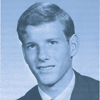Eugene Linden – 50th Reunion Essay
Eugene Linden
 43 Langdon Ave
43 Langdon Ave
Irvington, NY 10533
eogen@aol.com
College: Timothy Dwight
The entire arc of my career, such as it is, was shaped by my time at Yale.
During my senior year, and after a summer selling encyclopedias door-to-door to help pay for it, I had an epiphany. Tributaries to that epiphany were my experiences in selling encyclopedias, Ken Cavender’s course on mythology, a dive into Jung’s thoughts on the unconscious, and a deeper dive into the bizarre dynamics of the George Wallace phenomenon. Very late at night that spring of 1969 this stew of thoughts resolved itself into an image that veritably pulsated; an image of America as a personality in which the various cultural forces at work in the country of that time—the counterculture, the paranoia of the hard-right, religion, the elites who ran the bureaucracy—all became agents of a battle between the rational and irrational for control of the soul of America.
This epiphany stayed with me, and out of it came thoughts about the nature and origins of the consumer society, thoughts that I believed were sufficiently original to devote a career towards exploring. Before this epiphany, I had no idea what I wanted to do after college. Now I knew exactly what I wanted to do, but I also knew back then that no one was going to give an unpublished kid a book contract.
That changed after my article on fragging in Vietnam was published (another story for another time). The investigation got sufficient attention that I was approached by publishers inquiring whether I wanted to write a book. I did, but not on Vietnam, and in 1972 I had a contract to write my first book, Apes, Men, and Language.
An entirely reasonable question at this point would be: what do experiments attempting to teach chimpanzees sign language have to do with the consumer society? For me the answer is everything. A fundamental part of my theory about the origins of the consumer society was that it was the result of long chains of developments in Western thought. One chain had to do with freeing the hand of enterprise by getting the Gods (or God) out of daily life and up into outer space where He could be ignored, and another, corollary chain, which posited that the natural world was put at humanity’s disposal to use as we wished. To justify this, humanity had to be special, and the signal aspect of our specialness was our intellect and language. And so, hearing that experiments showed that chimps might have some capacity for language was interesting to say the least because if there was continuity between animal and human higher mental abilities, there went one pillar of our right to use nature as mere stuff.
My next book, The Alms Race, explored another aspect of the consumer society, namely, the way in which our charitable endeavors and the needs of the consumer society converged to expand the ambit of consumer behavior even as we thought we were doing good.
With those two books out, I thought I had built the credibility (the jury is still out) to tackle my thesis head on. And in 1981, Viking published Affluence and Discontent: The Anatomy of Consumer Societies. My timing could not have been worse, as it was the dawn of the Greed Is Good era, and the best sellers of that day were books like George Gilder’s Wealth and Poverty.
Ever since, I’ve continued to explore and develop these thoughts in books, articles, and essays. I’ve written about other issues as well, of course, but that epiphany gave a purpose to my writing for which I will be forever grateful, as I am grateful to Yale where I found order even amid the chaos of the times.
If the above is blank, no 50th reunion essay was submitted.
